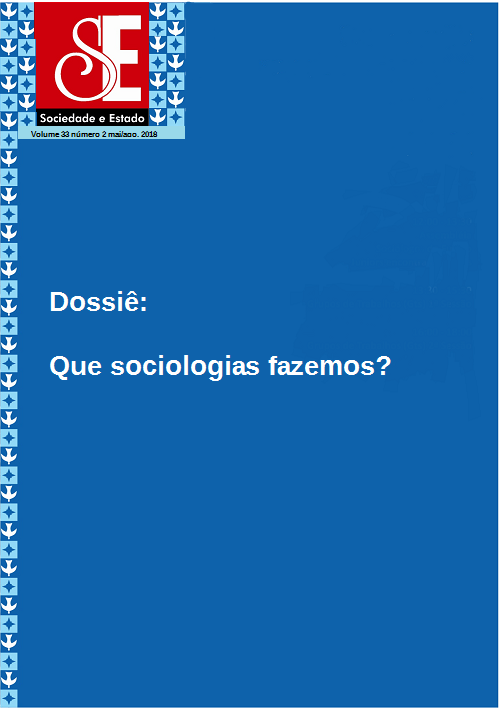Os desafios da globalização e a imaginação cosmopolita:
as implicações do Antropoceno
Palavras-chave:
Modernidade global, Mudança epocal, Evolução humana e biológica, História da Terra, AntropocenoResumo
O trabalho destaca que o conceito de Antropoceno refere-se a uma dimensão temporal no tempo geológico: é a época em que os seres humanos provocaram uma grande transformação na estrutura física da Terra. Trata-se de uma forma de autocompreensão histórica. Representa, assim, uma grande transformação na natureza geofísica do sistema Terra que coincide com a transformação mundial provocada pelo capitalismo e pela ocidentalização. O Antropoceno está inextricavelmente relacionado a questões sociológicas que dizem respeito ao capitalismo, à guerra, ao poder e à desigualdade em escala global. O texto destaca que a noção de Antropoceno não é simplesmente uma condição objetiva da mudança planetária, ou outro termo para a mudança climática, mas é, acima de tudo, uma categoria interpretativa pela qual as sociedades contemporâneas refletem sobre si mesmas e sobre a própria vida e reinventam seu espaço e tempo.
Tradução: Leo Lopes
Downloads
Referências
BECK, U. The cosmopolitan outlook. Cambridge: Polity Press, 2006.
BRAUDEL, F. The Mediterranean and the Mediterranean World in the Age of Philip XI. London: Penguin, 1990 [1987].
BROOKE, J. Climate change and the course of global history. Cambridge: Cambridge University Press, 2014.
CHAKRABARTY, D. The climate of history: four theses. Critical Inquiry, v. 35, p. 197-222, 2009.
CHERNILO, D. Debating humanity: towards a philosophical sociology. Cambridge (UK): Cambridge University Press, 2017.
CLARK, N.; GUNARATNAM, Y. Earthing the anthropos? From “socialising the Anthropocene to geologizing the social”. European Journal of Social Theory, v. 20, n. 1, p. 146-163, 2017.
COSTANZA, R.; GRAUMLICH, L.; STEFFEN, W. (Eds.). Sustainability or collapse? An integrated history and future of people on Earth. Cambridge (MA): MIT Press, 2011 [2007].
DAVIS, M. Late Victorian Holocausts: El nino famines and the making of the Third World. London: Verso, 2001.
DIAMOND, J. Collapse: how societies chose to fall or survive. London: Penguin, 2011 [2005].
---- . Guns, germs and steel: a short history of everybody for the last 13,000 years. New York: Vintage, 1998.
LOVEJOY, A. Gaia: A new look at life on Earth. Oxford: Oxford University Press, 2000 [1979].
LUKE, T. Reconstructing social theory and the Anthropocene. European Journal of Social Theory, v. 20, n.1, p. 80-94, 2017.
MCNEILL, J. R.; ENGELKE, P. The great acceleration: an environmental history of the Anthropocene. Cambridge (MA): Harvard University Press, 2014.
MILLS, C. W. The sociological imagination. London: Penguin, 1970 [1959].
MITHEN, S. The prehistory of the mind. London: Phoenix, 1998.
MOTA, A. Uncivilized civilizations. Social Imaginaries, v. 2, n. 4, 2016.
STEFFEN, W. et alii. The Anthropocene: from global change to planetary stewardship. Ambio, v. 40, p. 739-761, 2011.
PINKER, S. The better angels of our nature: a history of violence and humanity. London: Penguin, 2011.
RUSSELL, E. Evolutionary history: uniting history and biology to understand life on Earth. Cambridge (MA): Cambridge University Press, 2011.
SHRYOCK, A.; SMAIL, D. L. (Eds.). Deep history: the architecture of past and present. Berkeley (CA): University of California Press, 2011.
SMAIL, D. L. On deep history and the brain. Berkley (CA): University of California Press, 2008.
STEFFEN, W.; GRINEVALD, J.; CRUTZEN, P.; MCNEIL, J. The Anthropocene: conceptual and historical perspectives. Philosophical Transactions of the Royal Society, v. 369, p. 842-67, 2011.
STEFFEN, W. et alii. The trajectory of the Anthropocene: the great acceleration. The Anthropocene Review, v. 2, n. 1, p. 81-98, 2015.
STRYDOM, P. The sociocultural self-creation of a natural category: social-theoretical reflections on human agency under the temporal conditions of the Anthropocene.European Journal of Social Theory, v. 20, n. 1, p. 61-79, 2017.
THOMAS, J. A. History and biology in the Anthropocene: problems of scale, problems of value. American Historical Review, v. 119, n. 5, p. 1587-1607, 2014.
TURNER, B. S. Ritual, belief and habituation: religion and religions form the axial age to the Anthropocene. European Journal of Social Theory, v. 20, n. 1, p. 132-145, 2017.
ZALASIEWICZ, J.; WILLIAMS, M.; HAYWOOD, A.; ELLIS, M. The Anthropocene: a new epoch of geological time? Philosophical Transactions of the Royal Society, v. 369, p. 835-841, 2011.











